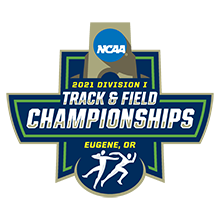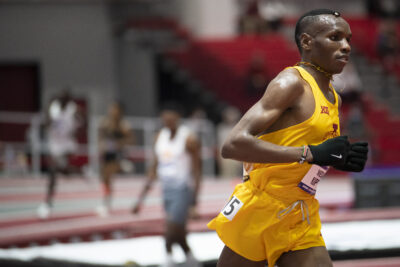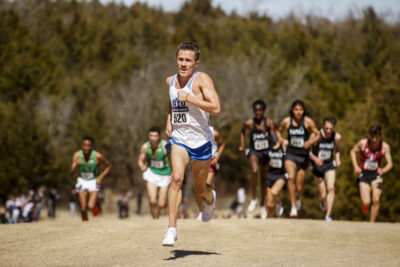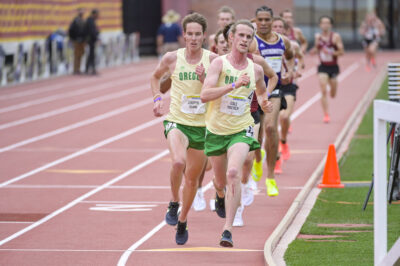2021 NCAA Outdoor Men’s 5K/10K/Steeple Preview: Hocker Chases Unprecedented Double & Mantz v Kiptoo in an NCAA XC Rematch
By Jonathan Gault
June 8, 2021
Oregon’s Cole Hocker is involved in two of the most fascinating plotlines of the 2021 NCAA Outdoor Championships. First is his duel with Notre Dame’s Yared Nuguse in the 1500, which we already broke down here. Should Hocker prevail in that race, he’d have the chance to make history less than two hours later with an unprecedented 1500/5k sweep, mirroring his incredible mile/3k double at NCAA indoors.
Below, we take a look at Hocker’s chances in the longer event while also previewing a wide-open steeple as well as the 10,000 final featuring the 2020 NCAA XC champ Conner Mantz, the 2019 NCAA XC champ Edwin Kurgat and the 2021 NCAA indoor 5000 champ Wesley Kiptoo.
*Schedule, entries, & results *TV/streaming information *All LRC coverage
Men’s 10,000: Mantz vs. Kiptoo (and others) in an NCAA XC grudge match
(final Wednesday, 10:38 p.m. ET)
| Athlete | Year | School | PB | SB | Note |
| Conner Mantz | JR | BYU | 27:41.16 | 27:41.16 | NCAA XC champ is top returner from ’19 (4th) |
| Abdihamid Nur | FR | N. Arizona | 27:47.27 | 27:47.27 | 7th at NCAA XC |
| Wesley Kiptoo | SO | Iowa St. | 27:37.29 | 27:58.10 | Fastest pb in field won NCAA indoor 5k, 3rd in XC |
| Edwin Kurgat | SR | Iowa St. | 27:58.33 | 27:58.33 | 2019 NCAA XC champ was 2nd behind Kiptoo at Big 12s |
| Isai Rodriguez | SO | Oklahoma St. | 28:08.70 | 28:08.70 | Twice top 10 in XC |
| Eric Hamer | SR | Colorado St. | 28:08.95 | 28:08.95 | NCAA indoor 5k runner-up |
| Aaron Bienenfeld | SR | Cincinnati | 28:10.95 | 28:10.95 | 5th in 5000 indoors |
| Robert Brandt | SR | Georgetown | 27:39.20 | 28:23.55 | Set the school record before he’d ever stepped foot on campus. LetsRun.com podcast guest |
| Vincent Kiprop | SR | Alabama | 28:19.07 | 28:23.60 | 26-year-old has 4 top-5 finishes at NCAAs |
| Adriaan Wildschutt | SR | Florida State | 28:25.11 | 28:25.11 | 4th NCAA indoor 5k, 2nd NCAA XC |
| Charles Hicks | FR | Stanford | 28:25.29 | 28:25.29 | Pac-12 champ was 14th in XC |
| Alex Masai | JR | Hofstra | 28:11.05 | 28:27.35 | 32nd in XC. Also in 5k |
| James Mwaura | SO | Gonzaga | 28:27.49 | 28:27.49 | Has run NCAA XC twice — never finished in top 100. Also made it in 5000 |
| Patrick Dever | SR | Tulsa | 28:28.13 | 28:28.13 | 5th at NCAA XC |
| Barry Keane | SO | Butler | 28:34.88 | 28:34.88 | Big East champ |
| Jack O’Leary | JR | Iona | 28:37.03 | 28:37.03 | 25th in XC |
| John Dressel | SR | Colorado | 28:42.17 | 28:42.17 | Pac-12 runner-up in 10k was 7th in XC in 2019 |
| Gilbert Boit | SR | Arkansas | 28:25.15 | 28:46.31 | 9th at ’19 NCAAs |
| Haftu Strintzos | FR | Villanova | 28:52.71 | 28:52.71 | 66th in XC. 6th in Big East 5000 |
| Nickolas Scudder | FR | Charlotte | 28:54.64 | 28:54.64 | 76th in XC |
| JP Trojan | SR | Syracuse | 28:55.00 | 28:55.00 | Runner-up at ACCs |
| Marcelo Rocha | JR | Providence | 28:58.92 | 28:58.92 | 4th in BIg East 5000 |
| Victor Shitsama | SO | Oklahoma St. | 29:03.90 | 29:03.90 | 8th in Big 12 meet |
| Christopher Alfond | SR | UMass Lowell | 29:06.17 | 29:06.17 | 70th in XC |
This should be fun. It’s not often that you get two NCAA XC champs (Conner Mantz & Edwin Kurgat) battling it out for an NCAA title on the track. Add in a third NCAA champ in Wesley Kiptoo, who set a meet record of 13:23.77 to claim the 5,000 at this year’s indoor championships, and this race should be a real slugfest.
Expect Kiptoo to get after it early. In most of his races, the Iowa State star likes to go out hard, build up a healthy lead, and then slow down to the point where he’s no longer flooring it but still running fast enough that no one is gaining on him. That strategy has proven wildly effective in races where Kiptoo is clearly the best guy in the field. And the idea of racing hard from the gun is not a bad one if you don’t believe in your kick. Remember, when Kiptoo & Kurgat faced Oregon stars Cooper Teare & Cole Hocker in a 5k in April, Kiptoo finished fourth, his 58.10 last lap no match for the men of Oregon.
The key for Kiptoo is finding the line between a fast pace and “too fast.” At regionals, he ran his first lap of the 10k in 60.80. That’s just dumb. There is no reason to go out that hard when only one other guy in the field went out in under 65 seconds and you only need to finish in the top 12 to qualify.
Of course, Kiptoo still qualified comfortably (he also went out in 59.79 at NCAA indoors and won that). Perhaps a better example is what happened at NCAA XC. One lap at close to 4:00 mile pace won’t kill you in a 10k, but an opening kilometer of 2:31 and a first 3k of 8:14 on a brutally tough Oklahoma State course just might. Maybe Mantz would have beaten Kiptoo anyway on that day (after all, he didn’t go out that much slower than Kiptoo), but you can’t tell me that Kiptoo’s string of absurd surges didn’t come back to bite him when Mantz put 23 seconds on him in the last kilometer.
Kiptoo has the fastest pb in the field here (27:37), but three other guys (Mantz, NAU’s Abdihamid Nur, and Georgetown’s Robert Brandt) have all broken 27:50 and aren’t that far behind. If Kiptoo goes out hard, he may be strong enough to eventually break all three — and everyone else. But if he misjudges his effort, don’t be surprised if someone who paced themselves smarter blows his doors off on the final lap.
As good as Kiptoo is, it’s hard to call anyone other than Mantz the favorite. Mantz’s 27:41 pb is just four seconds behind Kiptoo’s best, he was utterly dominant at NCAA XC, and though he has built a reputation as a grinder, he has enough speed (3:37 1500 pb) to prevail in a kick as well.
Then there’s this: five of the last six NCAA XC champs who ran the 10k at NCAAs won the race (the only exception: Liberty’s Sam Chelanga was 2nd in 2011). Considering NCAA XC was less than three months ago and Mantz won that race by 22 seconds, I like his chances.
There are a number of other guys who should be in the mix. Kurgat is a major talent who ran 13:20 earlier this year to beat Kiptoo over 5k (though he lost both of his 10ks to Kiptoo this year). Vincent Kiprop of Alabama was second in this race in 2018 and won the SEC 10k/steeple double this year. Florida State’s Adriaan Wildschutt was the NCAA runner-up in XC and has impressed this year outdoors, while Nur and Brandt have to be taken seriously after running well under 28:00.
JG prediction: Mantz has been terrific throughout 2021, and after their encounter at NCAA XC, I trust his decision-making more than Kiptoo’s. Mantz FTW.
Prediction by LetsRun.co co-founder Robert Johnson: Have you guys looked at the weather? With low 60 temps and super spikes, I guarantee you see the first sub-28:00 in NCAA championship history (the meet record is 28:01.30). If it doesn’t happen, the first person to email us at letsrun@letsrun.com will get a free t-shirt.
Men’s 5,000: Can Hocker make history?
(final Friday, 9:55 p.m. ET)
| Athlete | Year | School | PB | SB | Note |
| Cole Hocker | FR | Oregon | 13:19.98 | 13:19.98 |
NCAA mile/3k champ indoors will be doubling back from 1500 earlier in the day
|
| Cooper Teare | JR | Oregon | 13:17.13 | 13:20.24 |
2nd in NCAA 3k indoors + anchored winning DMR; runner-up to Hocker in Pac-12 5k
|
| Wesley Kiptoo | SO | Iowa State | 13:21.02 | 13:21.02 | Dominated NCAA indoor 5k but beaten by Hocker & Teare in April |
| Robert Brandt | SR | Georgetown | 13:24.31 | 13:24.31 | Big East champ was 9th in ’19 |
| Casey Clinger | FR | BYU | 13:24.90 | 13:24.90 |
2-time NXN champ. Is a freshman in track despite running NCAA XC in 2017
|
| Patrick Dever | SR | Tulsa | 13:28.08 | 13:28.08 | 5th at NCAA XC |
| Athanas Kioko | JR | Campbell | 13:28.41 | 13:28.41 | 19th placer in XC in 2019 won the 1500, 5000 and 10,000 at Big South this year |
| Luis Grijalva | JR | N. Arizona | 13:16.75 | 13:29.02 | Fastest pb in the field, but is he in that kind of shape? |
| Eric Hamer | SR | Colorado St. | 13:29.60i | 13:29.60i | NCAA indoor runner-up |
| Morgan Beadlescomb | JR | Michigan St. | 13:29.96i | 13:29.96i | Big 10 champ was 3rd at NCAA Indoors |
| Euan Makepeace | SR | Butler | 13:30.55 | 13:30.55 | Big East 5000 runner-up was 15th in XC in 2019 |
| Zach Facioni | SO | Wake Forest | 13:30.84 | 13:30.84 | ACC 5000 runnerup |
| Ben Veatch | JR | Indiana | 13:33.50i | 13:33.50i | Big 10 10k champ was 8th at NCAA Indoors |
| Charles Hicks | FR | Stanford | 13:34.63 | 13:34.63 | Pac-12 10k champ |
| Amon Kemboi | JR | Arkansas | 13:33.64i | 13:35.22 |
13th NCAA indoor 5k, 4th NCAA indoor 3k, 11th NCAA XC in 4-day span
|
| James Mwaura | SO | Gonzaga | 13:36.18 | 13:36.18 | Has run NCAA XC twice – never finished in top 100. Also made it in 10k. |
| Thomas Ratcliffe | SR | North Carolina | 13:32.81 | 13:36.87 | Top returner from ’19 (3rd) |
| Dylan Jacobs | SO | Notre Dame | 13:37.41 | 13:37.41 | ACC 3rd place in 5k and xC was 20th at NCAA XC |
| Vincent Kiprop | SR | Alabama | 13:37.92 | 13:40.11 | 26-year-old has 4 top-5 finishes at NCAAs |
| Conor Lundy | SR | North Carolina | 13:41.32 | 13:41.32 | Former Princeton runner was 7th at ACCs |
| Alex Masai | JR | Hofstra | 13:28.55i | 13:42.09 | 32nd in XC. Also in 5k |
| Olin Hacker | SR | Wisconsin | 13:42.96 | 13:42.96 | Big 10 runner-up |
| Ian Shanklin | SO | NC State | 13:48.20 | 13:48.20 | ACC 10k champ |
| Isaac Green | SR | Washington | 13:52.40 | 13:52.40 | 8th at Pac-12s |
In the 101-year history of the NCAA championships, no man has ever won both the 1500 and the 5000 meters at the same meet.
Three men, all legends of American distance running, have won both events (or their equivalents) in separate years: Kansas’ Wes Santee (5k in ’52, mile in ’53), Oregon’s Bill Dellinger (mile in ’54, 5k in ’56), and Villanova’s Sydney Maree (5k in ’79, 1500 in ’80 and ’81).
The closest anyone has ever come to winning both in the same year was Arizona’s Lawi Lalang in 2014. A day after defeating Edward Cheserek in an all-time classic 5,000, Lalang doubled back in the 1500 but came .04 shy of the title, falling to Oregon’s Mac Fleet. If a guy like Lalang, with pbs of 3:33/13:00 at the time, couldn’t do the double, it seemed as though no one ever would. Certainly not after the meet changed the schedule in 2015 to ensure the 1500/5k finals would be run on the same day.
Enter Oregon’s Cole Hocker, who will try to win them both in 2021. Let’s pause for a moment to give props to Hocker, who turned 20 years old last week. Championship meets are way more exciting when the best athletes challenge themselves by trying cool stuff. Remember how incredible it was when Galen Rupp won the 3k, 5k, and DMR at NCAA indoors in 2009? Or when Cheserek entered the mile, 3k, and 5k at NCAA indoors in 2017? Even if these insane doubles don’t work, they build excitement for each event. And if they do work, the athlete in question becomes a legend.
Hocker already proved indoors that he can handle two races with a quick turnaround (he’ll actually have more time to rest outdoors — roughly 100 minutes vs. 56 minutes indoors). The only question is whether this is the wisest move for Hocker’s Olympic chances — will he be able to recover from an intense double and still make it through three rounds at the US Olympic Trials? We can’t say for sure, but he’ll have almost two weeks to recover as the first round of the men’s 1500 at the Trials isn’t until June 24, 11 days after the NCAA 1500/5k finals.
Of the two events, the 1500 figures to be more difficult for Hocker at NCAAs, even though he’ll be running that race fresh. In the 5k, he’ll go off as the favorite, having beaten his chief rival, teammate Cooper Teare, twice already in 2021 over 5k (first when they were both fresh at the Oregon Relays in April, and again last month at Pac-12s when Hocker was doubling back from the 800 and Teare from the 1500). No one in this field can close like Hocker over the final 200, and no one seems capable of running fast enough to drop him; Hocker has the fastest time in the NCAA this year, 13:19.98, from a race in which he defeated Teare and Iowa State stars Wesley Kiptoo and Edwin Kurgat.
There are a few ways Hocker could lose, of course. Just because Hocker has doubled successfully in the past doesn’t mean it’s easy to do. When he won NCAA indoors in the mile, he set a meet record but he also wasn’t pushed. To beat Yared Nuguse in the 1500 outdoors will likely require Hocker to push his body to its limit — and even then, that might not be enough. A tough race against Nuguse, coupled with Kiptoo setting a hard pace in the 5k could be enough to make Hocker mortal and clear the way for someone like Teare or Northern Arizona’s Luis Grijalva, who has the fastest pb in the field (remember, he beat Teare at the Track Meet in December).
If Hocker doesn’t win, though, Teare is your most likely champion. He’s got terrific speed — remember, he’s the NCAA mile record holder (3:50.39) — and though he has lost to Hocker five times this year, he has also beaten him three times, more than anyone else.
Other guys to be aware of include Georgetown’s Robert Brandt, who has run gaudy pbs of 13:24 and 27:49, and North Carolina’s Thomas Ratcliffe. UNC coach Chris Miltenberg once told me he believed Ratcliffe was as talented as Grant Fisher, and he’s the top returner from the 2019 NCAA meet, where he finished 3rd. He was only 6th in the ACC 1500, though, and was beaten by both Brandt and Wake Forest’s Zach Facioni over 5k earlier this year.
JG prediction: One of my favorite things in running is when an overlooked or undervalued supertalent delivers with a title. A few recent examples from the men’s 5k spring to mind. Back in 2011, Sam Chelanga was in his final year at Liberty, and though he had won back-to-back NCAA XC titles, he no longer looked like the dominant force on the track as Iona’s Leonard Korir beat him in the 5k indoors and the 10k outdoors. But Chelanga summoned one last moment of greatness and beat Korir and Lawi Lalang to go out as a champion in the 5k.
In 2018, the hype centered around reigning NCAA champ Grant Fisher of Stanford facing off against NCAA XC/indoor 5k champ Justyn Knight of Syracuse. But the win went to Fisher’s teammate Sean McGorty, a fifth-year senior who had battled back from a torn Achilles the year before.
I view Cooper Teare in the same light. He’s one of the best runners in the NCAA, an absolute star in multiple distances, yet he’s never won an NCAA individual title and has been overshadowed recently by Hocker. I’m taking Teare — and wouldn’t be surprised if he turns pro following the meet.
Rojo prediction: Jonathan’s pick is right but his logic is wrong. The 5000 is the harder event for Hocker to win than the 1500 as he’ll be tired while many of his chief rivals in Kiptoo and Teare will be fresh. As good as Hocker’s double was indoors, I’m convinced if Kiptoo had been in the 3000 that Hocker wouldn’t have won as the pace would have been too hot up front and he would have been dropped before it came time to kick. In the 5000, in the middle of the day outside, even if if the temps will only be in the 60s, there is even more time to get dropped. And Kiptoo is in the race.
Men’s 3,000 steeplechase: It’s anyone’s guess
(prelims Wednesday, 8:32 p.m. ET, final Friday, 8:24 p.m. ET)
| Athlete | Year | School | PB | SB | Note |
| Fitsum Seyoum | SR | Virginia Tech | 8:31.23 | 8:31.23 | ACC champ & NCAA leader |
| Ahmed Jaziri | JR | E. Kentucky | 8:32.92 | 8:32.92 | Tunisian is #2 seed based on SB |
| Ryan Smeeton | JR | Oklahoma St. | 8:27.90 | 8:33.22 | Big 12 runner-up was 2nd at ’19 NCAAs |
| Alec Basten | JR | Minnesota | 8:33.80 | 8:33.80 | Big 10 champ is undefeated in steeples this year |
| Albert Kosgei | SR | Louisville | 8:34.28 | 8:34.28 | 3rd at ACCs, won his regional heat |
| Garrett Marsing | SR | BYU | 8:34.40 | 8:34.40 | Won Oregon twilight and his regional |
| Jackson Mestler | SR | Oregon | 8:35.32 | 8:35.32 | Pac-12 champ |
| Nathan Mylenek | SR | Iowa | 8:35.41 | 8:35.41 | Big 10 runner-up was 9th at ’19 NCAAs |
| Kigen Chemadi | SR | Mid. Tenn. St. | 8:35.75 | 8:35.75 | 3rd at ’19 NCAAs |
| Derek Johnson | SO | Virginia | 8:36.86 | 8:36.86 | 4th placer at ACCs |
| Bennett Pascoe | JR | Arkansas St. | 8:37.45 | 8:37.45 | Fastest time of anyone at regionals |
| Parker Stokes | FR | Georgetown | 8:38.55 | 8:38.55 | Big East champ was 74th in XC |
| Duncan Hamilton | SO | Montana St. | 8:39.02 | 8:39.02 | Made NCAAs indoors in mile despite 4:05 pb as it was run at altitude |
| Joost Plaetinck | JR | Michigan | 8:39.26 | 8:39.26 | 3rd at Big 10s |
| David Too | SR | Iowa State | 8:39.64 | 8:39.64 | 3rd at Big 12s |
| Colton Johnsen | JR | Washington St. | 8:39.99 | 8:39.99 | 6th at Pac-12s. Made it in 3k and 5k indoors |
| Clayson Shumway | SR | BYU | 8:36.25 | 8:40.11 | 7th & 10th at last two NCAAs |
| Felix Kandie | JR | Liberty | 8:40.23 | 8:40.23 | 13th in 2019 |
| Remi Schyns | SO | Butler | 8:40.39 | 8:40.39 | Big East runner-up was 64th in XC |
| Ky Robinson | FR | Stanford | 8:40.45 | 8:40.45 | 3rd at Pac-12s, 46th in XC |
| Zach Litoff | JR | Santa Clara | 8:42.11 | 8:42.11 | Last guy in out of West Regionals |
| Christian Hubaker | JR | Michigan | 8:43.38 | 8:43.38 | 4th at Big 10s |
| Aidan Tooker | JR | Syracuse | 8:30.10 | 8:44.09 | 4th at NCAAs in ’18 but only 12th at ACCs in ’21 |
| Alexander Korczynski | JR | Northeastern | 8:44.46 | 8:44.46 | 1st time in the Big Dance |
The men’s steeple may be the most wide-open distance event in this year’s championships. The NCAA leader, Fitsum Seyoum of Virginia Tech, ran 8:31 to win the ACC title but a month earlier ran 8:46 and was destroyed by eight seconds by Georgetown freshman Parker Stokes. The #2 seed, Ahmed Jaziri of Eastern Kentucky, has only run one steeple final this year, since his 8:23 season opener in April was later found to have been mismeasured. The top returner from 2019 NCAAs, Oklahoma State’s Ryan Smeeton, lost the Big 12 steeple by 14 seconds (thankfully for Smeeton and the rest of the field, the winner of that race, Wesley Kiptoo, opted for 5k/10k at NCAAs). There are nine guys clustered between 8:31 and 8:35. Good luck sorting them out.
JG prediction: Seyoum has the fastest time (8:31 at ACCs), but Jaziri has the most impressive head-to-head win, running 8:32 at the Kansas City Qualifier to defeat Smeeton. I also like the fact that the Tunisian Jaziri was 6th in the 3k at NCAA indoors, so I’m picking him FTW, but you could throw a dart among the top half-dozen runners and have a decent chance at predicting the champion.











